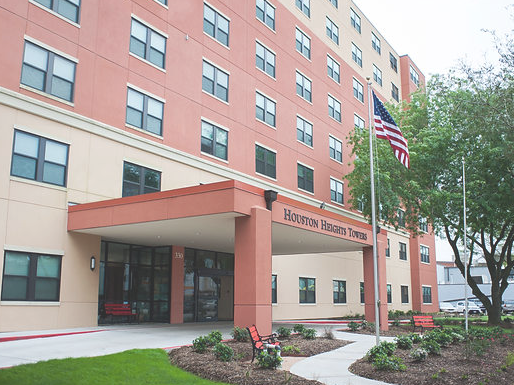I look forward to seeing what the city does about this.
Reyes and his neighbors at Independence Hall are among thousands of low-income and disabled seniors in Houston left to rely on their landlords for an organized response to last week’s catastrophic storms.
Many are low-income seniors with disabilities, living in subsidized housing and relying on functioning electricity to charge mobile oxygen machines, run in-home dialysis units, and power wheelchairs. With no power, some residents were rushed to the hospital after they suffered heat exhaustion or their portable oxygen machines died.
A Houston Landing review of federal housing data found at least 57 residential facilities in Houston – totaling over 8,800 low-income housing units – offering services to low-income and disabled seniors, with funding from federal tax credit programs for low-income housing developers.
It’s unclear how many facilities lost power and left residents to fend for themselves. Unlike nursing homes and assisted living facilities that provide higher levels of care, independent living facilities are not certified by the state of Texas, do not require state licensure and face scant oversight from regulators in comparison.
Texas also leaves property owners in charge of developing and implementing emergency response and evacuation plans. The results following Thursday’s storm have been disastrous, city officials say.
[…]
City Councilmember Abbie Kamin said she asked Linda Holder, vice president and chief operating officer at the nonprofit that owns the Heights Towers, about the company’s “emergency response” plan. According to Kamin, Holder responded: “We don’t have one.”
The dismal conditions inside some of the city’s senior living facilities have prompted outraged responses from public officials, including Mayor John Whitmire, who said residents were “abandoned.”
“Independence Hall Sunday afternoon was deplorable. People with no roofs over their apartments. The owners and managers had abandoned the site,” Whitmire said Wednesday.
Whitmire said the city was still in the process of surveying Houston’s senior living buildings.
“Part of our going forward will be to identify them, hold them accountable, and prevent that. They shouldn’t be doing business with any city, county or state or federal program when they’re so negligent to leave people,” Whitmire said at a Tuesday afternoon news conference.
[…]
In an interview Wednesday, the director of the city’s Housing and Community Development Department, Mike Nichols, said there are 28 senior living facilities that receive some sort of city financial support.
Other facilities receive funding from entities such as Harris County or the Houston Housing Authority, he said. Meanwhile, an uncounted number rely on rent payments from residents who receive Social Security Disability Insurance. Nichols said he is not aware of a list of all the facilities that cater to seniors or disabled people.
While many senior living facilities may have flown under the radar in the past, Nichols said the city hopes to change that going forward.
“One of the other things I hope to come out of this disaster is a more settled and organized approach to dealing with these problems on an ongoing basis. But it’s a clear necessity in Houston, Texas that if you’re going to have a senior living facility, it needs power even when the grid goes down,” Nichols said.
More broadly, Nichols said the city has a “severe issue” with people who rely on Social Security Disability Insurance living in substandard conditions at facilities like boarding homes and senior living facilities.
“It’s an issue. It’s really a statewide issue, not just a city issue. And we need to think about how to protect those vulnerable individuals. At this point, it is not a very good situation,” Nichols said.
See here for the background. The management of these facilities have denied the allegations when asked about them. I expect they will continue to be asked and will continue to assert they didn’t do what is being said about them. Be that as it may, I think there’s a lot of room for improvement here, certainly from an emergency management perspective. Just for the city to know who and where these places are, what if any contingencies they have and some estimate of their more vulnerable populations, all of that would be helpful. The story cites the New Orleans example following Hurricane Ida, which shows some of the limits of this approach. I look forward to seeing what the city does. And on a side note, there’s also plenty of room for improvement in how CenterPoint provides information about its outages, which is a matter that affects all of us. Let’s talk about this too, City Council.

